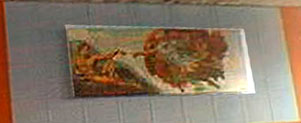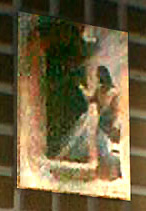 |  |  |
 |  |  |
Images above and below are from the NYCHS webmaster's 2006 photos
of Rikers' closed penitentiary (aka JATC) inmate chapel. They do not appear
in the book but are added in this presentation because the book mentions the chapel.
 . . . . Sacramental confessions at Rikers are so different from any human court of justice.
People begin by clearing away the dross, finding a new starting point, and then setting out once more. Years of false starts or vile actions cannot be swept away with a few words when these words are a mere formula. The penitent must understand what he or she has done. Attitude is everything. Sometimes the confessor must make clear what the secrecy of confession means. The penitent asks, "This is only between you and me, isn't it?” "No." I tell him, "it is between God and the two of us,” thereby strongly assuring my partner in this dialogue that I am obliged to secrecy and that I sin seriously if I break that secrecy." I often mention that I go to confession; that the pope and bishops. too, confess their sins, and so on. In short, I try
to put the man at ease, for I know only too well that this
never easy moment is also a moment of friendship, of the
mutual presence of two human beings, and that it is a
point of arrival with many old episodes behind it and
many new seeds sown. . . . .
. . .
|
 . . . . But can a person gain control of his life when everything is fragmented? "I was in court and my younger brother was there. He is twenty-two, I am twenty-four. "He told me that my mother had tried to commit suicide and had slashed her wrists.
"I have a brother condemned to life in prison, and now my younger brother is a codefendant with me. "I have a sister who sleeps around. "I myself may get fifteen years. "I would like to take communion because I think it is important.” The astonishing thing about this tragic life story of a prisoner encountered by chance is that he told it so easily. But this does not prevent me from seeing in him the pain of an all-encompassing why or wondering how to take the first step on the long road ahead. Despite all the obstacles, his willingness to find a way is there. . . . I immediately think of our community in the South Bronx listening to the teaching of Jesus in an ordinary chapel alongside the much larger parish church at Saint Pius on 145th Street. The chapel quickly fills with the men and women from the neighborhood, who gather around the modest cube-shaped altar. There, we experience simple and real moments of faith, accompanied by the strong, clear and very expressive Latin voices from the Caribbean and many parts of South America. Their songs are full of vigor and roll through the chapel like great organ blasts. I do not know whether it is the words, the tone and the melody, or one of these more than the others, that transforms the sacred space. In any case, in
that setting, I often think of what I heard a bishop say one
day: “The Spanish language is the language of the poor,
and it is excellent for paying homage to God.” . . . .
|
 . . . . I sometimes tell my friends in prison that every morning I must choose between the zoo and Jesus. I call prison a zoo because of the cages, because of the atmosphere, the animal-like existence that often prevails. The massive weight of evil in prison can be read in the eyes; it can be heard in the cries and in the silence; it can be seen behind the scene of commanding officers suddenly responding to an alarm and running with clubs, helmets and bulletproof vests through the corridors. . . . Saint Thomas stated that “A minimum of well-being is needed for the practice of virtue.” This minimum is often lacking in our prisons. Faced with this contempt, society cannot ignore Dostoyevsky’s warning, “A civilization is judged by what it does with its prisons." These words are appropriately inscribed over the entrance to each New York prison. . . . So often our “correctional” systems miss their target and do not rehabilitate but rather worsen the inmates. And we all pay the price as the mass of anger keeps increasing. . . . I saw a handicapped man in tears at Rikers when he was left in his wheelchair through the night waiting to be processed and assigned a cell. Another man had his face slashed like a subway map and needed more than two hundred stitches. Still another prisoner had a broom pushed in his rectum by other inmates. I remember Bill, who told me, “Before I kill, I pray.”
But when a commanding officer tells me that “to bestow too much care to prisoners, who are insignificant people, is to make monsters of them,” he does not even realize how cruel he sounds. . . . What, in his mind, does “too much care” mean when he is dealing only with “insignificant” people? His illusions about his authority are undermining that authority. He has already lost respect. He is no longer living in a city of human beings, but in a jungle or a warehouse. In the Bronx, a few days ago, I met three former prisoners who had come out after long terms. I asked each of them what he had learned in prison. One of them, who had spent twenty years “upstate,” as prisoners say when Speaking of the New York State prisons, told me simply that he had learned nothing. Twenty years with “nothing” is like a tourist facing a sign: “On this site nothing happened.” But twenty years with nothing is truly more like a death. Another of the three men, a sex offender and murderer, after forty-two years behind bars, told me that he had learned to express himself. . . . "But what am I to do now? Where am I to go, when I have perhaps twenty-five more years to live?” He was faced with the challenge of starting all over at sixty. . . . . I had known the last of the three on Rikers Island. A strong, determined man, he spent fourteen and a half years upstate. He has something in him of Jean Valjean, the courageous, unbeatable hero of Les Misérables Before his release in 1995, I had been to visit him in Dannemora, in Green Haven. “I believe that I spent the entire time with respect and dignity. I read, I learned, I changed, I wanted a positive result: to be able, by my attitude, to give something back to the society.” I was overjoyed to see him. Here before me was a mature man, enriched by having passed through the fire, open to what is ahead and even to the rejections he will inevitably meet. "I hide nothing in my resumé.” He said, “I keep to the truth. Now I only have to learn again how to take the initiative in my life. In prison they always told me what I had to do. It will turn out all right.” Despite his wonderful attitude, I could see him looking thoughtful and a bit vulnerable as he turned from me with the words: “This is
the first time I’ll be taking the subway by myself, at
night. I’ll have to be careful.”
|
|
|
Rev. Jared Curtis |
Auburn: |
1869 NYS Prison |
Finding the |